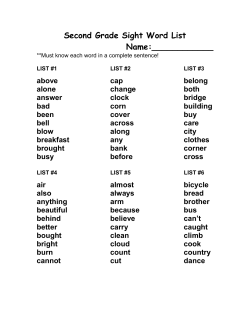
The Cuckoo Clock by Mrs Molesworth
The Cuckoo Clock by Mrs Molesworth Worksheet Name: A. What do you think? Before you read the book or the extracts on this worksheet answer the questions below. 1. When you look at the title of the book and the picture, what do you think this story is about? …………………………………………………………………………………………………………… …………………………………………………………………………………………………………… …………………………………………………………………………………………………………… …………………………………………………………………………………………………………… …………………………………………………………………………………………………………… ………………………………………………………………………………… 2. Why do you think it says Mrs Molesworth and not her first and last name like they do nowadays? …………………………………………………………………………………………………………………………………………………………… …………………………………………………………………………………………………………………………………………………………… …………………………………………………………………………………………………………………………………………………………… 3. Women in this time often had to write books under a pseudonym (a false name), why do you think this was the case? …………………………………………………………………………………………………………………………………………………………… …………………………………………………………………………………………………………………………………………………………… 4. Internet question: Go on the internet and find some information about Mrs. Molesworth, has she written any other stories, where did she live and how old was she when she wrote this book? And why do you think she was called the ‘Jane Austen of the nursery’? …………………………………………………………………………………………………………………………………………………………… …………………………………………………………………………………………………………………………………………………………… …………………………………………………………………………………………………………………………………………………………… …………………………………………………………………………………………………………………………………………………………… B. What do others think? Read what Jacqueline Wilson writes about this book and answer the questions below. First published in 1877, The Cuckoo Clock is obviously an old-fashioned story, a charming fairytale about a child called Griselda sent to live in a very, very old house with two very, very old aunts and their very, very old servant. (Their advanced age is constantly emphasised but I have an uneasy ©Creative Reading and Writing for children and teens feeling these three women are about my age.) Griselda is lonely and bored but the cuckoo in the old cuckoo clock is magic and takes her on various gentle, girlish adventures - to Butterflyland and the Other Side of the Moon. Griselda eventually finds a real child friend and the cuckoo tactfully flies back to his clock. (Jacqueline Wilson, December 21, 2002) 1. Why do you think Jacqueline Wilson says this is ‘obviously and oldfashiones story’? …………………………………………………………………………………………………………………………………………………………… …………………………………………………………………………………………………………………………………………………………… …………………………………………………………………………………………………………………………………………………………… …………………………………………………………………………………………………………………………………………………………… 2. Why do you think Jacqueline Wilson mentions Griselda is lonely and bored? …………………………………………………………………………………………………………………………………………………………… …………………………………………………………………………………………………………………………………………………………… 3. Why do you think Jacqueline Wilson suggests the cuckoo ‘tactfully’ flies back to the clock? …………………………………………………………………………………………………………………………………………………………… …………………………………………………………………………………………………………………………………………………………… 4. From reading this extract, do you think Jacqueline Wilson likes this book? Explain your answer. …………………………………………………………………………………………………………………………………………………………… …………………………………………………………………………………………………………………………………………………………… …………………………………………………………………………………………………………………………………………………………… C. What do you think this Cuckoo Clock looks like? Draw the Cuckoo Clock in the box below, you may look up pictures of Cuckoo Clocks but you can also invent one yourself. ©Creative Reading and Writing for children and teens D. Reading Read the extract below and answer the questions. She had slept a good long while, when again she wakened suddenly–just as she had done the night before, and again with the feeling that something had wakened her. And the queer thing was that the moment she was awake she felt so very awake–she had no inclination to stretch and yawn and hope it wasn't quite time to get up, and think how nice and warm bed was, and how cold it was outside! She sat straight up, and peered out into the darkness, feeling quite ready for an adventure. "Is it you, cuckoo?" she said softly. There was no answer, but listening intently, the child fancied she heard a faint rustling or fluttering in the corner of the room by the door. She got up and, feeling her way, opened it, and the instant she had done so she heard, a few steps only in front of her it seemed, the familiar notes, very, very soft and whispered, "Cuckoo, cuckoo." It went on and on, down the passage, Griselda trotting after. There was no moon to-night, heavy clouds had quite hidden it, and outside the rain was falling heavily. Griselda could hear it on the window-panes, through the closed shutters and all. But dark as it was, she made her way along without any difficulty, down the passage, across the great saloon, in through the ante-room door, guided only by the little voice now and then to be heard in front of her. She came to a standstill right before the clock, and stood there for a minute or two patiently waiting. She had not very long to wait. There came the usual murmuring sound, then the doors above the clock face opened–she heard them open, it was far too dark to see–and in his ordinary voice, clear and distinct (it was just two o'clock, so the cuckoo was killing two birds with one stone, telling the hour and greeting Griselda at once), the bird sang out, "Cuckoo, cuckoo." "Good evening, cuckoo," said Griselda, when he had finished. "Good morning, you mean," said the cuckoo. "Good morning, then, cuckoo," said Griselda. "Have you considered about me, cuckoo?" The cuckoo cleared his throat. "Have you learnt to obey orders yet, Griselda?" he inquired. "I'm trying," replied Griselda. "But you see, cuckoo, I've not had very long to learn in–it was only last night you told me, you know." The cuckoo sighed. "You've a great deal to learn, Griselda." "I dare say I have," she said. "But I can tell you one thing, cuckoo–whatever lessons I have, I couldn't ever have any worse than those addition sums of Mr. Kneebreeches'. I have made up my mind about that, for to-day, do you know, cuckoo–" ©Creative Reading and Writing for children and teens "Yesterday," corrected the cuckoo. "Always be exact in your statements, Griselda." "Well, yesterday, then," said Griselda, rather tartly; "though when you know quite well what I mean, I don't see that you need be so very particular. Well, as I was saying, I tried and tried, but still they were fearful. They were, indeed." "You've a great deal to learn, Griselda," repeated the cuckoo. "I wish you wouldn't say that so often," said Griselda. "I thought you were going to play with me." "There's something in that," said the cuckoo, "there's something in that. I should like to talk about it. But we could talk more comfortably if you would come up here and sit beside me." "Sit beside you up there!" she exclaimed. "Cuckoo, how could I? I'm far, far too big." "Big!" returned the cuckoo. "What do you mean by big? It's all a matter of fancy. Don't you know that if the world and everything in it, counting yourself of course, was all made little enough to go into a walnut, you'd never find out the difference?" "Wouldn't I?" said Griselda, feeling rather muddled; "but, not counting myself, cuckoo, I would then, wouldn't I?" "Nonsense," said the cuckoo hastily; "you've a great deal to learn, and one thing is, not to argue. Nobody should argue; it's a shocking bad habit, and ruins the digestion. Come up here and sit beside me comfortably. Catch hold of the chain; you'll find you can manage if you try." "But it'll stop the clock," said Griselda. "Aunt Grizzel said I was never to touch the weights or the chains." "Stuff," said the cuckoo; "it won't stop the clock. Catch hold of the chains and swing yourself up. There now–I told you you could manage it." (From: The Cuckoo Clock by Mrs. Molesworth, 1877) 1. Now that you have read this extract, can you write down why Jacqueline Wilson called this story old-fashioned? …………………………………………………………………………………………………………………………………………………………… …………………………………………………………………………………………………………………………………………………………… 2. Why is the Cuckoo killing two birds with one stone? …………………………………………………………………………………………………………………………………………………………… …………………………………………………………………………………………………………………………………………………………… 3. Write down why the cuckoo keeps telling Griselda she has got a lot to learn. …………………………………………………………………………………………………………………………………………………………… …………………………………………………………………………………………………………………………………………………………… …………………………………………………………………………………………………………………………………………………………… ©Creative Reading and Writing for children and teens 4. Why does the Cuckoo say that size is only a matter of fancy and how does he explain that to Griselda? Do you agree with what he says? …………………………………………………………………………………………………………………………………………………………… …………………………………………………………………………………………………………………………………………………………… 5. What do you think happened to Griselda at the end of this extract? What do you think will happen next? …………………………………………………………………………………………………………………………………………………………… …………………………………………………………………………………………………………………………………………………………… …………………………………………………………………………………………………………………………………………………………… …………………………………………………………………………………………………………………………………………………………… 6. A few words in the extract above are underlined. Do you know what these words mean? Or can you maybe guess from reading the rest of the sentence? Down below write down your guess and then look up the word in the dictionary to see if you were right. If there are more words you don’t know you can add them to the table. Word/ verb Inclination To peer To trot Ante-room To murmur Statement To exclaim Digestion What do you think it means? What does the dictionary say? E. Now write! Read the extract below and answer the questions. Griselda opened her eyes. What did she see? The loveliest, loveliest garden that ever or never a little girl's eyes saw. As for describing it, I cannot. I must leave a good deal to your fancy. It was just a delicious garden. There was a charming mixture of all that is needed to make a garden perfect–grass, velvety lawn rather; water, for a little brook ran tinkling in and out, playing bo-peep among the bushes; trees, of course, and flowers, of course, flowers of every shade and shape. But all these beautiful things Griselda did not at first give as much attention to as they deserved; her eyes were so occupied with a quite unusual sight that met them. This was butterflies! Not that butterflies are so very uncommon; but butterflies, as Griselda saw them, I am quite sure, children, none of you ever saw, or are likely to see. There were such enormous numbers of them, and the variety of their colours and sizes was so great. They were fluttering about everywhere; the garden seemed actually alive with them. ©Creative Reading and Writing for children and teens Griselda stood for a moment in silent delight, feasting her eyes on the lovely things before her, enjoying the delicious sunshine which kissed her poor little bare feet, and seemed to wrap her all up in its warm embrace. Then she turned to her little friend. "Cuckoo," she said, "I thank you so much. This is fairyland, at last!" The cuckoo smiled, I was going to say, but that would be a figure of speech only, would it not? He shook his head gently. "No, Griselda," he said kindly; "this is only butterfly-land." (From The Cuckoo Clock by Mrs. Molesworth, 1877) 2. Who do you think the ‘I’ is in this extract? …………………………………………………………………………………………………………………………………………………………… …………………………………………………………………………………………………………………………………………………………… 3. Why does the ‘I’ say what Griselda saw cannot be described? …………………………………………………………………………………………………………………………………………………………… …………………………………………………………………………………………………………………………………………………………… 4. What do you ‘see’? Draw the garden or/and the butterflies below. ©Creative Reading and Writing for children and teens 5. Griselda wants nothing more than to go to fairy-land. Now imagine you are the Cuckoo’s friend and he tells you you can go wherever you like. Where would you go? Write down your perfect trip below. Maybe you can even write a paragraph in which the Cuckoo brings you there? …………………………………………………………………………………………………………………………………………………………… …………………………………………………………………………………………………………………………………………………………… …………………………………………………………………………………………………………………………………………………………… …………………………………………………………………………………………………………………………………………………………… …………………………………………………………………………………………………………………………………………………………… …………………………………………………………………………………………………………………………………………………………… …………………………………………………………………………………………………………………………………………………………… …………………………………………………………………………………………………………………………………………………………… …………………………………………………………………………………………………………………………………………………………… …………………………………………………………………………………………………………………………………………………………… …………………………………………………………………………………………………………………………………………………………… …………………………………………………………………………………………………………………………………………………………… …………………………………………………………………………………………………………………………………………………………… …………………………………………………………………………………………………………………………………………………………… …………………………………………………………………………………………………………………………………………………………… …………………………………………………………………………………………………………………………………………………………… …………………………………………………………………………………………………………………………………………………………… …………………………………………………………………………………………………………………………………………………………… …………………………………………………………………………………………………………………………………………………………… …………………………………………………………………………………………………………………………………………………………… …………………………………………………………………………………………………………………………………………………………… …………………………………………………………………………………………………………………………………………………………… …………………………………………………………………………………………………………………………………………………………… …………………………………………………………………………………………………………………………………………………………… …………………………………………………………………………………………………………………………………………………………… …………………………………………………………………………………………………………………………………………………………… …………………………………………………………………………………………………………………………………………………………… …………………………………………………………………………………………………………………………………………………………… …………………………………………………………………………………………………………………………………………………………… …………………………………………………………………………………………………………………………………………………………… …………………………………………………………………………………………………………………………………………………………… …………………………………………………………………………………………………………………………………………………………… …………………………………………………………………………………………………………………………………………………………… …………………………………………………………………………………………………………………………………………………………… …………………………………………………………………………………………………………………………………………………………… …………………………………………………………………………………………………………………………………………………………… …………………………………………………………………………………………………………………………………………………………… …………………………………………………………………………………………………………………………………………………………… …………………………………………………………………………………………………………………………………………………………… …………………………………………………………………………………………………………………………………………………………… ©Creative Reading and Writing for children and teens
© Copyright 2025









